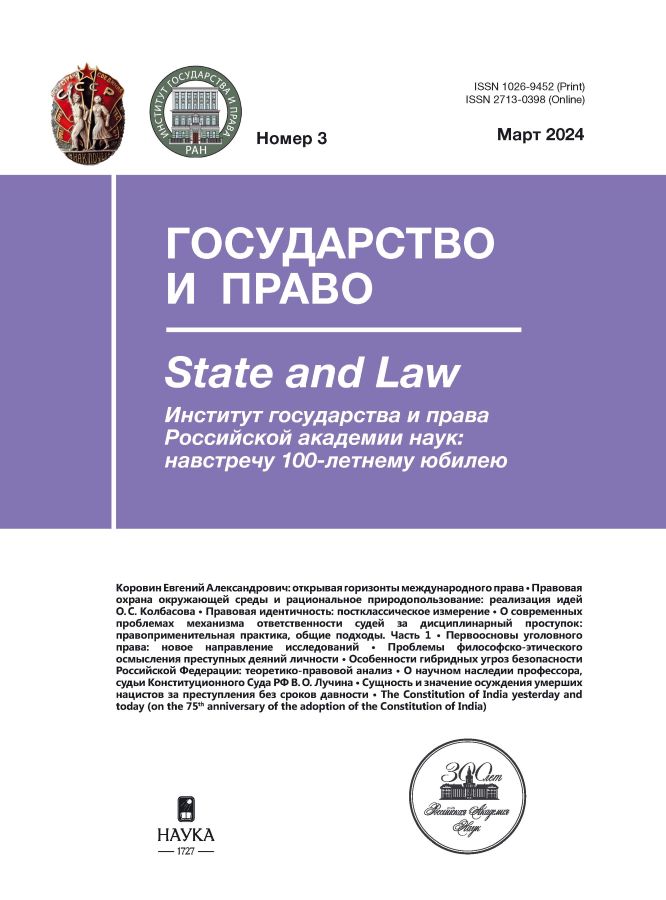Abuse of power with selfish motivation of officials in the estates of the Peasant Bank at the turn of the XIX–XX centuries (historical and legal aspect)
- Authors: Frolov S.A.1
-
Affiliations:
- Tambov State Technical University
- Issue: No 3 (2024)
- Pages: 193-197
- Section: Pages of history
- URL: https://rjmseer.com/1026-9452/article/view/648996
- DOI: https://doi.org/10.31857/S1026945224030199
- ID: 648996
Cite item
Abstract
The study of the historical and legal foundations of the restriction of corrupt actions testifies to the appearance of the term “official crimes” in the Military Article of Peter the Great. Among its varieties: abuse of power for the selfish purposes of officials, bribery, etc. The article attempts, based on the analysis of the facts of abuse of power at the turn of the XIX–XX centuries, to study the forms of manifestation of corrupt behavior by the head of the estates of the Peasant Bank and the clerks hired to help him, detourers, the headman. The study of archival material reveals proven cases of corruption among officials in the bank’s estates in 1893–1899. Despite the prosecution of people involved in corruption in the Tambov branch and with the beginning of the ХХ century, there were facts received from peasants for renting land, embezzlement of funds. A similar selfish behavior of officials was characteristic of the Ryazan branch of the Bank. In general, the revealed manifestation of forms of forms of corruption in the activities of a state credit institution led to undermining the confidence of peasants in the presence of legal order in the Russian Empire and created a prerequisite for the emergence of a revolutionary situation in the village.
Full Text
About the authors
Sergey A. Frolov
Tambov State Technical University
Author for correspondence.
Email: seif.saf@rambler.ru
Candidate of Historical Sciences, Associate Professor, Head of the Theory and History of State and Law Department of the Law Institute
Russian Federation, TambovReferences
- Vasiliev Ya. A. Novgorod branch of the Peasant Land Bank and its activities (1885–1914) // The North-West in the Agrarian History of Russia: interuniversity thematic collection of scientific papers. Kaliningrad, 2000. Pp. 40–49 (in Russ.).
- Dowengauer O. V. Activity of the Peasant Land Bank at the turn of the XIX–XX centuries (based on the materials of the Tver province) // Finance and credit. 2015. No. 12 (636). Pp. 55–66 (in Russ.).
- Kostyleva E. N. Activity of state mortgage banks in the late XIX – early XX century (based on the materials of the Ryazan province): dis. … Candidate of Historical Sciences. Ryazan, 2015. Pp. 70, 71 (in Russ.).
- Kostyleva E. N. Features of the activity of the Peasant Land Bank in the conditions of economic modernization of the Russian Empire at the end of the XIX – beginning. XX century (based on the materials of the Ryazan province) // Historical, philosophical, political and legal sciences, cultural studies and art criticism. Questions of theory and practice. Tambov, 2014. No. 2 (40). Part 1. Pp. 93–95 (in Russ.).
- Orlova E. E. Monitoring technologies for improving the effectiveness of law-making in the CIS member States in the context of the Eurasian perspective // Law: History and Modernity. 2021. No. 2 (15). Pp. 96–106 (in Russ.).
- Suleymanov T. M. The fight against corruption in Russia in the IX– XIX centuries: historical and legal analysis // History of State and Law. 2010. No. 7. Pp. 25, 26 (in Russ.).
Supplementary files










